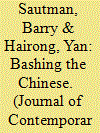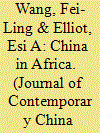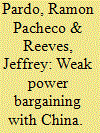|
|
|
Sort Order |
|
|
|
Items / Page
|
|
|
|
|
|
|
| Srl | Item |
| 1 |
ID:
134615


|
|
|
|
|
| Summary/Abstract |
The 2010 shooting of 13 miners at Zambia's small, privately-owned ‘Chinese’ Collum Coal Mine (CCM) has been represented by Western and Zambian politicians and media as exemplifying the ‘neo-colonial’ and ‘amoral’ practices of ‘China’ and ‘the Chinese’ in Africa. CCM has been used to provide a sharp contrast to the supposed ways of the Western firms that own most of Zambia's mines. Embedded in racial hierarchy and notions of strategic competition between the West and China, the discourse of the CCM shootings further shapes conceptions of global China and Chinese overseas. While examining all the oppressive conditions that have given rise to protest at the mine, we contextualize the shooting and subsequent conflicts. In analyzing CCM's marginal and troubled development, we discuss aspects of the 2010 shooting incident known to miners and union leaders, but ignored by politicians and media. We look at the shooting's political fallout, focus also on the epilogue that was the 2012 CCM riot—in which one Chinese person was murdered and several others seriously injured—and trace the sometimes violent discontent manifested at other foreign-owned mines in Zambia since their privatization in the late 1990s. The empirical data for this detailed study derive from hundreds of documentary sources and interviews with union leaders, workers, officials and others in Zambia from 2011 to 2013.
|
|
|
|
|
|
|
|
|
|
|
|
|
|
|
|
| 2 |
ID:
134617


|
|
|
|
|
| Summary/Abstract |
Entering the twenty-first century, particularly under the reign of Hu Jintao, China began to pursue an increasingly pro-active diplomacy in Africa. Most analysis on China's offensive diplomacy in Africa focuses on Beijing's thirst for energy and raw materials, and for economic profits and benefits. That is why it is often called ‘energy diplomacy’ or ‘economic diplomacy’ as if China, just like Japan in the 1980s, became another ‘economic animal’. But if one looks at the history of the PRC's foreign policy, Beijing has seldom pursued its diplomacy from purely economic considerations. Is this time any different? This article exams China's diplomacy in Africa from a strategic and political perspective such as its geo-strategic calculations, political and security ties with African countries, peacekeeping and anti-piracy efforts in the region, support for African regionalism, etc. It argues that China's diplomatic expansion in Africa, while partially driven by its need for economic growth, cannot be fully understood without taking into consideration its strategic impulse accompanying its accelerating emergence as a global power. Africa is one of China's diplomatic ‘new frontiers’ as exemplified by new Chinese leader Xi Jinping's maiden foreign trip to Africa in 2013.
|
|
|
|
|
|
|
|
|
|
|
|
|
|
|
|
| 3 |
ID:
134612


|
|
|
|
|
| Summary/Abstract |
This article reports and analyzes China's presence in Africa with an emphasis on how that has been perceived by the Africans. Based on the findings from surveys and field research conducted in eight sub-Saharan African countries and interviews with scholars and practitioners from other African countries as well as Chinese and Americans in Africa, we outline the diverse, complicated and evolving African perceptions about China's explosive presence in general and the booming Chinese business activities in particular that now range from love to suspicion. Our findings about how China is perceived in Africa suggest that Beijing has acquired substantial goodwill in Africa yet is developing deep issues and facing uncertain challenges and growing obstacles.
|
|
|
|
|
|
|
|
|
|
|
|
|
|
|
|
| 4 |
ID:
134611


|
|
|
|
|
| Summary/Abstract |
Chinese engagement in African states has increased tremendously over the last decade, much in line with Chinese globalisation strategies and supported by state encouragement and financial support. The size and potential of China as a world power leads to the level of expectations the country faces from the developing world. However, some elements of these expectations are also created through political discourses which emphasise differences with Western countries. The types of promises that the Chinese leadership makes to create such enthusiastic welcome amongst African political leaders are linked closely to the discourse on South–South cooperation. Albeit different from Western development assistance promises and parallel attempts to produce moderate expectations, the current discourse is thus partly sowing the seeds for future disappointment. This article takes a closer look at the discussions around South–South cooperation in China–Africa relations and at key rhetorical features (‘mutual benefit’; ‘non-interference’) and at the practice of this cooperation. It concludes that the Chinese discourse is creating large public expectations in African countries and while China delivers on many projects, its impact on development is less certain. The overall development success of this strategy builds on longer-term success and is implicitly linked to the occurrence of more reforms in Africa. Chinese policy thus ‘bets on the future’ in their foreign relations with Africa; the success of this strategy is dependent on political circumstances among the partners that are largely beyond Chinese control. In a number of cases, it can thus be expected that currently up-beat political rhetoric is going to meet obstacles that will require adjustments in a discourse that, in its current form, might undermine Chinese credibility if not the core elements of South–South cooperation altogether.
|
|
|
|
|
|
|
|
|
|
|
|
|
|
|
|
| 5 |
ID:
134616


|
|
|
|
|
| Summary/Abstract |
This article examines China's response to the 2011 Libya crisis and the emergence of a new diplomatic imperative: overseas citizen protection. Over a 12-day period in February and March 2011, China evacuated more than 35,000 Chinese nationals from civil war torn Libya, testing the overseas crisis management capacity of the Chinese government. Because of increasing domestic pressure to protect the growing population of Chinese citizens abroad, Beijing is developing its diplomatic and military capabilities to manage and mitigate crises overseas. The large-scale Libya evacuation served as a wake-up call for Beijing, that conducting business in high risk countries around the world comes at a price; as a consequence, Beijing will be compelled to reassess its global strategic posture and foreign policy principles.
|
|
|
|
|
|
|
|
|
|
|
|
|
|
|
|
| 6 |
ID:
134620


|
|
|
|
|
| Summary/Abstract |
This article examines the emergence of distorted memories of Imperial China. Through popular online sites and media, populist nationalists have obtained exaggerated yet extremely sensational knowledge of Chinese history, which portrays Imperial China as benevolent, strong and more advanced than the western world. Based on these distorted memories, they blame all diplomatic controversies on other countries—western nations for their imperialist exploitation and especially neighboring countries for their ungratefulness to the Chinese empire. Due to the declining appeal of communism, as well as the corruption and isolation of official academia, the Chinese government is under heavy pressure to follow the distorted memory and restore China's historical glory.
|
|
|
|
|
|
|
|
|
|
|
|
|
|
|
|
| 7 |
ID:
134618


|
|
|
|
|
| Summary/Abstract |
Using a survey of 1,280 Chinese college students, this article explores the impact of Internet use in China on political beliefs. By controlling for overall Internet exposure and differentiating between visits to government websites and to non-government on-line sources, I find that the more students browse ‘vertically’, the more supportive they are of the regime and the less they endorse democratic norms, and that the more they browse ‘horizontally’, the more likely they are to agree with democratic norms but are not significantly less willing to support the regime. I also find that Party membership raises support for the regime, and that family income exerts a U-shaped impact on regime support, but neither has an independent and significant effect on agreement with democratic values. Analyses of other individual characteristics further refine the finding that regime support and democratic orientation do not necessarily contradict each other. Students who do not strongly support the current regime are not necessarily democracy seekers.
|
|
|
|
|
|
|
|
|
|
|
|
|
|
|
|
| 8 |
ID:
134613


|
|
|
|
|
| Summary/Abstract |
While China has found niches based on its comparative advantages and gained a solid ground in Africa, its almost single-minded way of pursuing business interests without regard to many issues of local and international concern has caused backlashes. Learning lessons the hard way, China has made efforts to adjust such insensitive business practices in recent years, motivated by its changing economic and strategic interests.
|
|
|
|
|
|
|
|
|
|
|
|
|
|
|
|
| 9 |
ID:
134619


|
|
|
|
|
| Summary/Abstract |
This article examines Mongolia's and North Korea's bargaining with the People's Republic of China to provide insight into Northeast Asian regional dynamics and weak state bargaining behavior. The article demonstrates how both Mongolia and North Korea (which it demonstrates are weak states) employ a variety of tactics within the categories of capitulation, neutrality and confrontation when managing their respective relations with China. The article also argues the applica`bility of the two case studies to a better understanding of the diplomatic challenges China faces as it continues its development and to China's relations with the various weak states on its periphery.
|
|
|
|
|
|
|
|
|
|
|
|
|
|
|
|
| 10 |
ID:
134614


|
|
|
|
|
| Summary/Abstract |
Chinese state-owned enterprises (SOEs) have gradually localized their workforce since they began operating in Ghana in the 1980s. Examining their workforce localization patterns, the Chinese SOEs in Ghana appear to be diverse in their business practices and highly autonomous from the Chinese state. Our hypothesis on the substantial autonomy of Chinese SOE overseas subsidiaries, which is consequent to the lack of management control from the Chinese central authority since the Chinese economic reform, contrasts the dominant assumption in the China–Africa debate, in which Chinese SOEs are depicted as closely linked to the Chinese state and/or as the arms of the new Chinese policy in Africa. The workforce localization process of Chinese SOEs in Ghana is largely determined by factors like profit maximization objective, market competition and political pressure. The localization experience is similar to those of Western companies in Africa where complete workforce localization takes a long time to achieve.
|
|
|
|
|
|
|
|
|
|
|
|
|
|
|
|
|
|
|
|
|